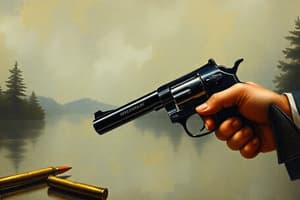Podcast
Questions and Answers
What is Ballistics?
What is Ballistics?
- The study of projectiles
- The study of projectiles, trajectories, and their effect on the target (correct)
- The study of ammunition types
- The study of firearms identification
What does Firearms Identification determine?
What does Firearms Identification determine?
Whether a bullet or cartridge was fired by a particular weapon.
The three categories of Ballistics are _______, _______, and _______.
The three categories of Ballistics are _______, _______, and _______.
Internal, External, Terminal
What happens internally in a firearm?
What happens internally in a firearm?
What is explained in external ballistics?
What is explained in external ballistics?
What is terminal ballistics?
What is terminal ballistics?
The three types of bullets are _______, _______, and _______.
The three types of bullets are _______, _______, and _______.
How does a gun work?
How does a gun work?
What is a Revolver?
What is a Revolver?
What characterizes a Semiautomatic firearm?
What characterizes a Semiautomatic firearm?
What distinguishes Sub-Machine Guns?
What distinguishes Sub-Machine Guns?
What defines a Hunting Rifle?
What defines a Hunting Rifle?
What is unique about a Shotgun?
What is unique about a Shotgun?
What are Striation Marks?
What are Striation Marks?
What causes Striations in firearms?
What causes Striations in firearms?
What are Spiral Grooves?
What are Spiral Grooves?
What is the significance of Several Points of Comparison in ballistics?
What is the significance of Several Points of Comparison in ballistics?
Caliber is the _______ of the gun barrel.
Caliber is the _______ of the gun barrel.
What describes Gunpowder Residues?
What describes Gunpowder Residues?
What is Distance Determination?
What is Distance Determination?
What are Visual residues in ballistics?
What are Visual residues in ballistics?
What does Integrated Ballistics Identifications System (IBIS) do?
What does Integrated Ballistics Identifications System (IBIS) do?
What is the National Integrated Ballistics Information Network (NIBIN)?
What is the National Integrated Ballistics Information Network (NIBIN)?
Flashcards are hidden until you start studying
Study Notes
Ballistics
- The study of projectiles, trajectories, and their effects on targets.
Firearms Identification
- Concerned with determining if a bullet or cartridge was fired from a specific weapon.
Categories of Ballistics
- Comprises three main types: Internal, External, and Terminal.
Internal Ballistics
- Focuses on events occurring within the firearm during the firing process.
External Ballistics
- Examines the bullet's path after it exits the barrel.
Terminal Ballistics
- Analyzes the effects and interactions of a bullet upon hitting the target.
Types of Bullets
- Includes Round Nose, Hollow Point, and Wadcutter.
How a Gun Works
- Firing sequence: firing pin hits the cartridge base → ignites primer powder → sparks ignite main propellant → pressure expels bullet from the case into the barrel → bullet follows lands and grooves out of the barrel.
Revolver Mechanism
- Functions by rotating the cylinder to position a cartridge before the barrel, followed by cocking and releasing the hammer when the trigger is pulled.
Semiautomatic Firearms
- Feature quicker firing and loading capabilities; typically utilize a magazine that can hold up to 30 cartridges.
Sub-machine Guns
- Can alternate between automatic and semiautomatic fire modes; use larger ammunition compared to standard handguns.
Hunting Rifles
- Equipped with a hand-operated mechanism for ejecting cartridges post-firing and loading a fresh one.
Shotgun Characteristics
- Fires numerous small lead pellets, increasing hit probability, as opposed to a single bullet.
Striation Marks
- Unique markings on each bullet allow for identification and matching to specific firearms through comparison.
Striations
- Created via the rifling process in gun barrels.
Spiral Grooves
- Grooves cut or impressed in the bore of the barrel, contributing to bullet stabilization during flight.
Points of Comparison
- Using comparison microscopes, experts assess striation marks, land and groove counts and orientations, and caliber matching.
Caliber
- Refers to the diameter of the gun barrel, usually measured in millimeters.
Smooth Barrels
- Shotguns have smooth barrels; the gauge measures barrel diameter rather than caliber.
Firing Process Steps
- Primer explosion → powder ignition → gas buildup → bullet propulsion through the barrel → cartridge case contact with breech face → imperfections are transferred to the bullet and cartridge case.
Drugfire
- A forensic tool developed for the FBI to analyze unique markings on spent cartridge casings.
Integrated Ballistics Identification System (IBIS)
- Created for ATF&E, it digitally analyzes distinguishing features on spent bullets and cartridge casings.
National Integrated Ballistics Information Network (NIBIN)
- A unified system that merges both IBIS and Drugfire applications.
Gunpowder Residue
- Discharged firearms emit unburned and partially burned gunpowder particles along with smoke, impacting targets.
Distance Determination
- Involves estimating the shooting distance based on powder distribution or shot spread patterns.
Visual Evidence
- Examines visible residues like unburned gunpowder and stippling or tattooing patterns on targets.
Chemical Analysis
- Focuses on identifying residues from firearms through chemical processes (incomplete information provided).
Studying That Suits You
Use AI to generate personalized quizzes and flashcards to suit your learning preferences.




